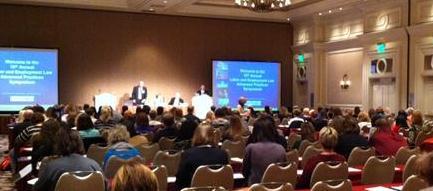 From March 12 to 14, hundreds of HR professionals from across the country gathered at the Bellagio in Las Vegas for the 10th annual Labor & Employment Law Advanced Practices (LEAP) Symposium, hosted by Business Management Daily and The HR Specialist. Here are some nuggets of wisdom from the event:
From March 12 to 14, hundreds of HR professionals from across the country gathered at the Bellagio in Las Vegas for the 10th annual Labor & Employment Law Advanced Practices (LEAP) Symposium, hosted by Business Management Daily and The HR Specialist. Here are some nuggets of wisdom from the event:
RETALIATION
“Retaliation is like staring at the clouds; employees see what they want to see,” said Jim Dale, an attorney with Stoel Rives in Boise. “Don’t focus so much on what is the legal standard of retaliation. Focus instead on how it would look to a jury … Retaliation isn’t just the most frequent claim, it’s the most dangerous.”
HEALTH CARE REFORM
“Don’t waste a good crisis. The Affordable Care Act is one of the biggest HR crises of this generation and it gives you a clean sheet of paper to design a new comp and benefits program at your organization, and you can blame it on the ACA,” said Karl Ahlrichs, an insurance expert at Gregory & Appel in Indianapolis
HANDBOOKS
“Remember that every state has weird, quirky laws that you have to incorporate into your employee handbook,” said Steven Suflas, an attorney at Ballard Spahr in New Jersey. “Also, there are always new things coming down the pike in employment law, so make sure to keep your handbook updated. HR can get into a lot of mischief by letting their handbooks go stale.”
IN THE COURTROOM
“It’s the most anger I’ve seen against corporate America in the 30 years I’ve been doing this,” said Dan Gallipeau, co-founder of Dispute Dynamics and an expert on U.S. juries. “If jurors are angry, it doesn’t matter what’s on the
verdict form. They will find a way (to make employers liable).”
UNIONS
Regarding the National Labor Relations Board (NLRB) revived “quickie election” rules that could shorten the time from petition to union vote from 38 days to 21 days, attorney Jonathan Kaplan of Littler in Memphis said, “You can no longer wait until a petition gets filed. This places a much greater premium on being proactive in preparing for union activity and creating a rapid-response team … Staying nonunion is going to become a 24-7-365 activity.”
THE EEOC
“The EEOC has very broad investigative powers,” warned EEOC commissioner Constance Barker during her lunchtime keynote session. “Any little tidbit of information we get (during an EEOC investigation) can lead us to investigate that matter, too, which can lead to a systemic case.” Barker also noted that “the biggest mistake employers make is a lack of communication” by failing to make sure lower-level managers know about company policies and follow through on enforcing them.
CONFESSIONS OF A PLAINTIFF’S LAWYER Andrew Rempfer has practiced employment law from both the employer and employee sides and he currently represents employees for the Cogburn Law Offices in Las Vegas. Here is some of the insider advice from “the other side” that Rempfer gave to the HR professionals in attendance:
Andrew Rempfer has practiced employment law from both the employer and employee sides and he currently represents employees for the Cogburn Law Offices in Las Vegas. Here is some of the insider advice from “the other side” that Rempfer gave to the HR professionals in attendance:
• “I get more calls about retaliation than anything else. A lot of their initial claims don’t have much merit until they tell me about their retaliation story.”
• “HR needs to make sure their investigations are clean and precise, because we dig into those very deeply.”
• “Companies still don’t regularly audit their job descriptions … I cannot fathom to this day why employers don’t look at the job duties to see if they match” the FLSA exemptions.
• “I do believe there are a few rotten apple companies out there, but in most lawsuits we file, it’s just bad managers and bad training that cause HR nightmares.”
